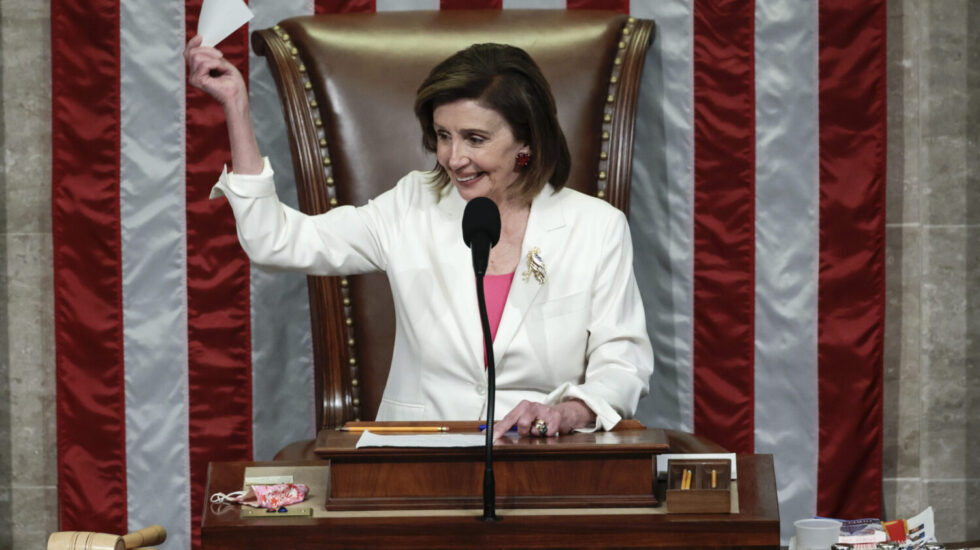The House of Representatives on Friday morning passed a nearly $2 trillion spending package which makes historic investments in education, health care, child care, and initiatives to combat climate change.
The final vote was 220 to 213. All Republicans – and one Democrat, Jared Golden of Maine – voted against the legislation. It now moves to the Senate, where it will likely be pared down to appease centrist West Virginia Senator Joe Manchin.
The Build Back Better bill – a centerpiece of President Joe Biden’s economic agenda – has been the subject of intense negotiations within the Democratic party for months. A major hurdle to its passage was cleared on Thursday when the Congressional Budget Office released an analysis of its cost. Several moderate Democrats insisted that the CBO weigh-in before they were willing to green light the spending.
The CBO found that bill will contribute $367 billion to the deficit over the next 10 years. However, the CBO figure does not account for increased tax compliance triggered by a massive investments in the Internal Revenue Service. The Biden White House estimates that giving the IRS $80 billion dollars in additional resources will generate $400 billion dollars over a decade.
Once that figure is considered, insists the White House, the Build Back Better bill pays for itself.
Treasury Secretary Janet Yellen said various analyses “make it clear that Build Back Better is fully paid for.”
(While not included in its official analysis, the CBO estimates the investment in the IRS will generate just $207 billion. Once that number is added to the CBO’s evaluation of the Build Back Better bill, the group thinks it will add $160 billion to the deficit over the next decade.)
Democrats had been hoping to pass the bill soon after the CBO released their report on Thursday, but House Minority Leader Kevin McCarthy delayed the vote by giving a rambling, eight hour speech focused on maligning Biden’s agenda. The Washington Post reports:
The GOP leader’s ongoing remarks often drew jeers and laughs from Democrats, some of whom left as he spoke. But it ultimately had some effect, even if temporarily: Once the speech lapsed past midnight and into its fourth hour, Democratic leaders made the decision to hold off on a vote on the spending bill until later Friday.
“We’re going to recess, and we’ll come in at 8 a.m.” Friday, House Majority Leader Steny H. Hoyer (D-Md.) told reporters.
“He wants to do it in the middle of the night,” Hoyer said of McCarthy’s motivations for speaking for so late. “We’re going to do it in the light of day.”
Speaker Nancy Pelosi began Friday’s House session by predicting the bill “will be the pillar of health and financial security in America.”
Bloomberg reports on its details:
It would provide universal pre-K, childcare subsidies, four weeks of subsidized paid family leave, subsidized Obamacare premiums and an alternative to Medicaid in some states, and would allow Medicare to negotiate prescription drug prices for the first time while capping out-of-pocket costs for seniors. Medicare would cover hearing benefits for the first time.
The legislation aims to fight climate change by imposing a fee on methane and providing a slew of tax credits for renewable energy and electric vehicle purchases, and it would provide relief from deportation for millions of undocumented immigrants.
On the tax side, the bill would extend expanded child tax credits and make them permanently refundable to those without sufficient income-tax liability to get the full benefit. It would also increase the cap on federal deductions for state and local taxes, a provision that will benefit wealthy taxpayers and which has sparked some push-back from progressives.
“If you are a parent, a senior, a child, a worker, if you’re an American, this bill’s for you,” Pelosi said.
The bill would also establish a new 15% minimum corporate tax rate and a 5% surtax on individuals who make over $10 million a year. Taxpayers who make over $25 million would face an additional 3% levy.
The bill’s Senate fate is far from assured. The Wall Street Journal explains:
Some centrist Senate Democrats haven’t committed to supporting the House legislation, and Sen. Joe Manchin (D., W.Va.) has called for removing a proposed paid-leave program. Other Democrats are seeking changes to the House plan for raising the $10,000 cap on the deduction for state and local taxes, warning that the proposed $80,000 cap with no income limit offers unnecessary tax cuts for high-income households. A measure giving temporary legal protections to immigrants in the U.S. illegally may face parliamentary problems that could force Democrats to strip it from the bill.
If those measures are altered in the Senate, the bill would have to return to the House for another vote before going to Mr. Biden’s desk.
Axios adds:
Senate Majority Leader Chuck Schumer (D-N.Y.) on Thursday morning did not give an indication of a timeline once the bill reaches the Senate. “We’re going to keep working on this important legislation until we get… it done,” he said in a speech on the Senate floor.



